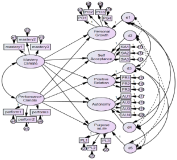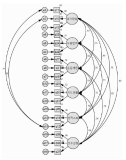PURPOSE This study investigated the perceptions and experiences of collegiate student-athletes with mental health concerns who are receiving sport psychology services. METHODS A total of 196 college student-athletes (98 male, 98 female) were recruited for the quantitative phase, while 14 athletes from 7 sports participated in the qualitative phase. This integrated approach sought to provide a comprehensive perspective on the research subject. The quantitative participants answered scales for depression (CES-D), anxiety (GAD-7), social support (NCAA RSSS), and mental help-seeking attitude (MHSAS), and the qualitative participants underwent in-depth interviews using a semistructured questionnaire based on a socioecological model. Quantitative data were examined using confirmatory factor analysis, reliability measures, independent t-test, and one-way analysis of variance via SPSS 28.0 and AMOS 28.0, and qualitative data were inspected through content analysis and expert meetings. RESULTS First, higher levels of depression, anxiety, and perceived social support were reported by female athletes as opposed to male athletes. Second, athletes in individual sports reported higher levels of social support than those in team sports. Third, athletes who planned to undergo future psychological counseling reported higher anxiety, social support, and helping attitudes than those with no plans to do so. Fourth, athletes who slept for more than seven hours reported lower levels of depression and anxiety and higher levels of perceived social support than those who slept for six hours or less. Fifth, freshman athletes reported higher depression levels than sophomore athletes. Sixth, student-athletes with no scholarships had higher anxiety levels than those with partial scholarships, who then reported higher perceived social support than those with full scholarships. Seventh, a lack of accessibility was the primary barrier to psychological service access for student-athletes. Eighth, engagement in interpersonal relationships was identified as a major stressor among student-athletes. CONCLUSIONS Differences in collegiate student-athletes’ mental health status as well as perceptions of and experiences in sport psychology services depend on various factors. These findings may serve as foundational data for improving sport psychology support services for collegiate student-athletes.
PURPOSE This study compares the effects of video group and metaverse group counseling for student athletes to analyze differences in immersion, sychological skills learning effects, and each approach’s participation experiences. METHODS Twenty-four high school archery students were divided into three groups: a metaverse experimental, a video comparison, and a control group. For the experimental and comparative groups, 10 non-face-to-face psychological skills training sessions were conducted. With the control group, results were compared and analyzed by measuring psychological skills and social presence pre- and post-training. Additionally, analysis of the qualitative effects of psychological skills training was performed. RESULTS The psychological skill test’s quantitative analysis of the video comparison group showed a more significant effect in anxiety control factors than the metaverse experimental and the control groups. Moreover, in the social presence test, both the metaverse and the video groups showed significant differences in social presence and satisfaction; furthermore, Scheff post-verification results showed that the two environments’ satisfaction was significantly higher than that of the control group. Qualitative analysis confirmed that the metaverse and video groups experienced psychological, technical, and relational changes in common. CONCLUSIONS Although the metaverse group using avatars was likely to increase immersion, both the video and the metaverse groups were effective in psychological skills training, suggesting that the training effect may vary depending on the non- face-to-face environment’s stability and participation method. Future studies should examine effects of applying the metaverse platform to sports psychological skills training and various psychological support activities by solving the metaverse environment’s technical limitations.

Purpose This study identified the influence of perceived motivational climate on psychological well-being in ballet majors. Methods Participants were 211(male=25, female=186) collegiate students enrolled in ballet department. Measures were The Perceived Motivational Climate in Sport Questionnaire(PMCSQ) and Psychological Well-being Questionnaire. Data were analyzed by using descriptive statistics, reliability test, correlation, and structural equation modeling. Results Results were as follows. First, mastery climate who ballet majors perceive significantly influenced on the five subscales of their psychological well-being: Mastery climate was positively related to personal growth, self-acceptance, positive relation with others, autonomy, and purpose in life. Second, performance climate who ballet majors perceive significantly influenced on the five subscales of their psychological well-being: Performance climate was negatively related to personal growth, self-acceptance, positive relation with others, autonomy, and purpose in life. Model fit indices were acceptable(RMSEA=.070). Conclusion In conclusion, this study indicated that motivational climate who ballet majors perceive was a important situational factor on their psychological well-being.

PURPOSE For student-athletes to be able to successfully dedicate themselves to training and competition, the following key factors play an important role: The coach, team climate, and individual motivational characteristics. To test this hypothesis, the structural relationships between having a perceived autonomy support, a caring climate, basic psychological needs, and sport commitment were analyzed. METHODS Participants were 297 high school athletes registered with the Korea Olympic Committee (203 males, 94 females, Mage=17.88 years). Data were collected using sports climate questionnaires for autonomy support, caring climate scale, basic psychological needs scale, and sport commitment measurement. The collected data were analyzed using descriptive statistics, correlation analysis, and structural equation modeling. RESULTS The model’s fitness was indicated by x2/df=2.797 (x2=106.288, df=38), CFI=.977, TLI=.967, RMSEA=.078 (90% CI=.061, .096). Examining the various path coefficients revealed that coach autonomy support had a positive effect on the athlete’s caring climate, basic psychological needs, and sport commitment. The caring climate had a significant effect on basic psychological needs, but did not have a statistically significant effect on sport commitment. Finally, basic psychological needs had a positive effect on sport commitment. CONCLUSIONS Coach autonomy support fosters a caring climate, and athletes who are able to perceive this are able to dedicate themselves to their sport since their basic physiological needs are met. Therefore, coaches should use appropriate coaching strategies to enhance athletes' autonomy and foster a caring climate, as both are essential factors for meeting athletes' psychological needs and promoting sport commitment.

The purpose of this study was to examine the relationship among service quality, psychological experiment, and positive feedback including the moderating effect of motivation at Formula One World Championship. Therefore, the proposed research model was divided and compared by the level of motivation. By using questionnaire method, we found the following results. First, high motivation group indicated a higher-level of service quality, psychological experiment, and positive feedback than low motivation group's. Second, service quality had an influence on positive feedback directly and indirectly with the psychological experiment as a mediator. Third, it would be more effective for high motivation group that driving positive feedback through promotion while both promotion and watch is effective for low motivation group to drive positive feedback. Thus, promotion is considered as an important factor in both high and low motivation group and the watch needs to be strengthened in high motivation group.

PURPOSE This study aimed to examine the mediating effect of psychological needs in the relationship between multiple coaching styles and teamwork among college football players. METHODS This cross-sectional study involved 526 elite football players. Descriptive statistics, reliability analysis, confirmatory factor analysis, correlation analysis, path analysis, and macroprocess were performed using statistical software to test the mediation effects of the data collected. RESULTS The findings suggested that autonomy-supportive and structure coaching styles positively correlated with and impacted psychological needs satisfaction and teamwork. Conversely, control and chaos coaching styles negatively correlated with and impacted psychological needs satisfaction and teamwork. In addition, autonomysupportive and structure coaching styles negatively correlated with and impacted psychological need frustration, while control and chaos styles positively correlated with and impacted psychological needs frustration. Furthermore, psychological needs satisfaction and frustration were found to partially mediate the relationships between autonomy support and teamwork, structure and teamwork, control styles and teamwork, and chaos styles and teamwork. CONCLUSIONS Autonomysupportive and structure coaching styles positively influenced teamwork by satisfying psychological needs. In contrast, control and chaos coaching styles negatively impacted teamwork by contributing to psychological needs frustration.

This study was to explore and confirm factors of sport psychology counseling needs in Korean elite coaches. In order to achieve this purpose, 56 elite coaches in Korean Olympic training center at Taereung and Jincheon responded on open-questionnaire and 260 coaches responded on survey. Open-ended questionnaire responses were analyzed by inductive content analysis and collected survey data were analyzed by exploratory factor analysis and confirmatory analysis. The results were as follows: Firstly, sport psychology counseling needs of elite coaches were competition preparation, negative athlete-coach relationship, athlete private problems, performance degradation, pressure on performance result, injury management, team cohesion degradation, motivation, training management, different gender athlete control, athletes drop out, pressure from outside, conflicts with colleagues, neglecting from athletes, feeling of incompetence, emotional control problem, and so on. Secondly, based on these responses, closed-ended questionnaire was developed, surveyed, and analyzed. Exploratory factor analysis illustrated that sports counseling needs of coaches were performance enhancement strategies, unreasonable pressure, negligence on training, coaching stress, competition result stress, conflicts with athletes. Finally, confirmatory factor analysis showed that construct of sport counseling needs illustrated appropriate fit indices values. The results of this study contributed to provide fundamental information on coaching education program and sport psychology counseling program development and application. Consequently, it will help coaches to control their mind at coaching in training and competitions.

This study was to identify the structure of anger behavior that athletes illustrated in competitions. In order to achieve research purpose, 167 high school, college, and professional athletes responded to open questionnaires. Targeting 541 players, the structural validity of psychological measurement was verified. As a result of analyzing the sources of anger behaviors during matches, four factors of anger-out, anger-in, anger control, and anger-helplessness were deduced. Afterwards, the validity of 4 factor-model was verified through correlation analysis with trait anger and verification of group differences. That is, the level of trait anger had a positive relationship with expression of anger-out and anger-helplessness while it had a negative relationship with anger-in and anger-control. Especially, the behavioral aspect such as anger-helplessness is a structure that has not been found in other criteria of anger behavior and it reflects the uniqueness of sports situation. Based on such results, the significance of sport anger behavior and implications were discussed.
PURPOSE With participants in recreational sports clubs, this study clarified positive psychological capital’s mediating effect on the relationship between exercise commitment and perceived stress. METHODS A survey conducted with individuals actively engaged in recreational sports a yielded data for statistical analysis from 296 respondents. Data processing involved frequency analysis, confirmatory factor analysis, reliability analysis, correlation analysis, structural equation modeling, and testing for mediating effects using the SPSS 29.0 and AMOS 29.0 programs. RESULTS First, results showed that exercise commitment did not significantly impact perceived stress. Second, exercise commitment positively influenced positive psychological capital. Third, positive psychological capital negatively impacted perceived stress. Fourth, positive psychological capital mediated completely between exercise commitment and perceived stress. CONCLUSIONS This research encourages participation in physical activities, especially among those with low physical activity levels, because it positively affects both physical and mental well-being, ultimately enhancing social benefits and overall quality of life.
PURPOSE This study aimed to subdivide the market based on the general characteristics and consumer psychology of sports brand collaboration consumers and provide basic data for efficient collaboration marketing activities of sports companies. METHODS The subjects of this study were high school, college, and graduate students from high schools and universities in the Seoul and Gyeonggi area. Of the 600 copies of the questionnaire distributed, 475 were selected and analyzed in the final sample. Regarding the statistical method for this study, the PASW 18.0 statistical program was used for the frequency, exploratory factor, reliability, hierarchical cluster, K-means clustering, and cross analyses, as well as the one-way ANOVA. RESULTS The results of the analysis suggested five subdivided clusters with according marketing strategies: “external male,” “practical male,” “twenties design preferred female,” “low-interest women,” and “high consumption optional attributes” groups.